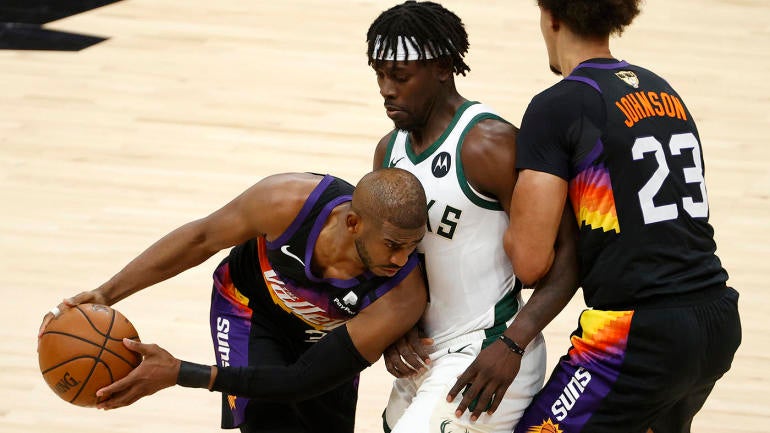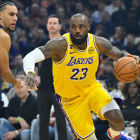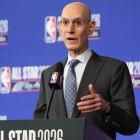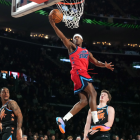NBA Finals: From the Suns' pick-and-roll to the Bucks' switching issues, here's what we learned from Game 1
The Bucks have some problems to solve, starting on the defensive end

Shortly before Game 1 of the 2021 NBA Finals on Tuesday, the Milwaukee Bucks announced that Giannis Antetokounmpo would be in the starting lineup. Given that he was only a week removed from hyperextending his left knee, this was extraordinary news.
Unfortunately for the Bucks, it was all downhill from there. Chris Paul lit them up for 32 points on 12 for 19 shooting and nine assists in his first Finals game, and the Phoenix Suns earned led by as many as 20 points in their 118-105 victory.
Here's four things we learned:
1. The Suns' pick-and-roll game remains unsolved
Milwaukee opened the game with P.J. Tucker defending Paul, Jrue Holiday defending Devin Booker and the same defensive strategy that worked so well against the Atlanta Hawks in the last two games of the conference finals: Switch everything, even with Brook Lopez on the court. The idea here is simple: Keep the ball in front, stay out of rotation, prevent Paul from doing his normal pick-and-roll dance.
Initially, this seemed to be jamming up the Suns' offense. Paul missed an elbow jumper over Lopez on their first possession and Booker bricked a pull-up 3 on the next one. Eventually, however, both of them found a rhythm. Lopez did his best to move his feet and keep a hand up, but, by the time he picked up a flagrant foul for stepping under Paul's foot on a 4-point play early in the third quarter, it was abundantly clear that the Bucks needed to try something else.
On the box score, Lopez's minus-17 is as glaring as his 23 minutes played. The big man never returned after checking out with about five minutes left in the third quarter. Phoenix scored 126 points per 100 possessions with him on the court. You'll forget all these details, but years from now, regardless of how this series plays out, the mere mention of this game should conjure an image of Paul or Booker in the middle of the floor, isolated against a 7-foot-tall rim protector.
Lopez was far from the only victim, however. When the Bucks were switching, the Suns were happy to attack Bobby Portis:
And Pat Connaughton:
And Bryn Forbes:
Milwaukee didn't even exclusively switch with Lopez on the court. Before coach Mike Budenholzer pulled him, the Bucks tried putting him in his normal position: A deep drop. Of all the brilliant plays Paul made, his filthiest came against this coverage:
That kind of defense is designed to give up pull-up 2s like these:
After Lopez took a seat, Milwaukee tried trapping and showing in order to make Paul pick up his dribble:
Nothing worked. It was reminiscent of Game 1 against the Hawks and, more worryingly, playoff losses against the Miami Heat and Toronto Raptors in previous years. The Bucks were stuck in a vortex with nothing but bad options: Conventional coverage risks letting Paul and Booker operate comfortably, making the same reads they've been making all season, while switching serves up a panic-inducing mismatch whenever the Suns want it.
Regardless of what style they choose to play, Milwaukee needs to execute better defensively. In the first quarter, Deandre Ayton got an easy two points because of a miscommunication between Holiday and Portis:
In the third, Ayton got another easy two after Antetokounmpo failed to match up properly in transition, Middleton allowed Mikal Bridges to cut past him and nobody crashed the glass when Lopez contested Bridges' shot:
If there is reason for optimism, it is that the Bucks adjusted in Game 2 against Atlanta. Maybe they'll try something similar this time, with Holiday pressuring Paul, Tucker pestering Booker, Lopez playing higher up and more aggressive help in the gaps. (The most confusing possessions of the opener were the ones in which the Bucks switched with Holiday on Paul and the ones in which they didn't switch with Tucker on Paul.) Maybe they'll still switch selectively -- late in the shot clock, when Ayton is on the bench, when the Holiday-Connaughton-Middleton-Antetokounmpo-Tucker lineup is on the court -- on Thursday, or maybe they'll completely abandon it.
The beauty of Phoenix's offense, though, is that it is built to attack any scheme. The Suns space the floor, put pressure on the rim and have two of the better matchup-hunters in the world in the backcourt. This is not the same kind of opponent as the banged-up Hawks.
2. Easy baskets are hard to come by against Suns, even for Milwaukee
Milwaukee scored a putrid 92.9 points per 100 possessions in the halfcourt, per Cleaning The Glass, which would be less concerning if it had not scored even fewer than that in eight playoff games during this run. In contrast, the Suns scored 106.7 points per 100 possessions in the halfcourt, which is about two points better than the Brooklyn Nets' league-best regular-season mark. And the worst part is that the Bucks can't even try to blame this on poor shooting this time: Tucker, Lopez, Portis, Connaughton, Forbes and Jeff Teague went a combined 10 for 18 (55.6 percent) from 3-point range.
Holiday (10 points in 40 minutes, 4 for 14) passed well but couldn't get going as a scorer. Middleton (29 points in 45 minutes, 12 for 26) had a phenomenal second half but wasn't particularly efficient. Ayton, Jae Crowder and even Cameron Johnson fared pretty well against Antetokounmpo (20 points in 35 minutes, 6 for 11, 7 for 12 from the free-throw line). The problem, however, was not so much that Milwaukee had trouble in the halfcourt but rather that it couldn't make up for that whatsoever.
The Bucks have survived some scary situations this postseason by cobbling together stops, transition points and extra possessions. That didn't happen on Tuesday. Milwaukee attempted the same amount of field goals as Phoenix, and the Suns attempted 10 more free throws. The Bucks lost the turnover battle, the fast break points battle and scored a total of three second-chance points.
This is a nightmare scenario. It is also not shocking, given that Phoenix typically takes care of the ball, rebounds well and gets back in transition.
3. The Bucks are wary of going big
One of the reasons Milwaukee didn't do much on the offensive glass: Lopez and Portis, who had started Games 5 and 6 against Atlanta, barely played together, and Portis logged a total of 14 minutes. Antetokounmpo played all but 24 seconds of the fourth quarter, without a traditional center next to him, and more than half of it without Tucker.
This wasn't the first time Budenholzer elected to pull Lopez during the playoffs. Less than two weeks before becoming a playoff hero, Portis was completely out of the rotation. It's not hard to figure out how the Bucks wound up back here, and it's unclear what roles they will play going forward. When Milwaukee made a mini-run in the fourth quarter, it had a Holiday-Forbes-Connaughton-Middleton-Antetokounmpo lineup out there.
Whichever way Budenholzer chooses to go, there will be trade-offs. It's significantly harder to play smallball with Donte DiVincenzo unavailable, and, for all the defensive problems Lopez might continue to have in this series, he is one of the Bucks' best offensive players. Game 1 illustrated the dilemma that they face, and it's notable that they erred on the side of switchability.
4. Ayton appears to be ready for this
Ayton started the game matched up with Antetokounmpo, and while he got pushed around a couple of times in isolation, he competed as well as you could reasonably expect. More importantly, the soon-to-be 23-year-old center put up a 22-point, 19-rebound stat line. That Ayton did this in his Finals debut is simultaneously extraordinary and unremarkable. He just did the same stuff he's been doing all playoffs.
The Suns posted up Ayton a few times against switches, mostly early in the game, but they didn't overdo it. He forced nothing, finished like he always does, rolled hard like he always does and was just about always in the right place defensively. He played 39 minutes, partially because Dario Saric had to leave the game with an injury in the first half, and he avoided foul trouble. It's unreal that this has become so normal.


















